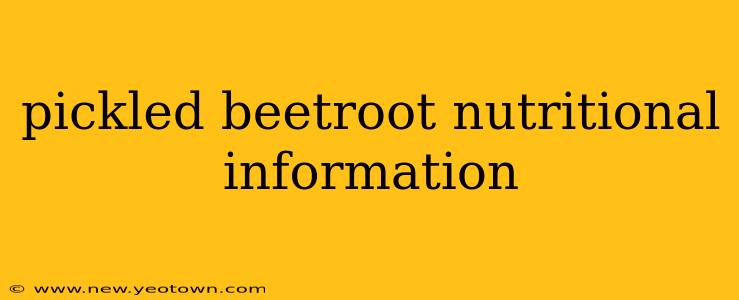Pickled beetroot. The very name conjures up images of vibrant crimson hues, a tangy, slightly sweet flavor, and perhaps, a nostalgic memory of a grandmother's recipe. But beyond its deliciousness lies a surprising nutritional profile that makes pickled beetroot a worthy addition to a healthy diet. This isn't just a condiment; it's a concentrated source of vital nutrients, often overlooked in the modern diet.
Let's delve into the world of pickled beetroot, exploring its nutritional benefits and answering some frequently asked questions.
What are the nutritional benefits of pickled beetroot?
Pickling beetroot doesn't strip it of all its goodness, despite the process altering its texture and taste. In fact, the fermentation process during pickling can even enhance certain aspects of its nutritional profile. While the exact nutritional content can vary depending on the recipe and ingredients used, generally, pickled beetroot is a good source of:
-
Nitrates: This is arguably pickled beetroot's biggest claim to fame. Nitrates are converted into nitrites in the body, which then relax blood vessels, improving blood flow and potentially lowering blood pressure. Numerous studies have explored the potential cardiovascular benefits of dietary nitrates, with beetroot regularly appearing as a star player.
-
Antioxidants: Beetroot, in both its fresh and pickled form, is packed with antioxidants, notably betalains. These powerful compounds combat oxidative stress, protecting your cells from damage and potentially reducing the risk of chronic diseases. The vibrant red color of beetroot is, in fact, a visual cue to its high antioxidant content.
-
Fiber: Though pickling might slightly reduce the fiber content compared to fresh beetroot, pickled beetroot still contributes to your daily fiber intake. Fiber aids digestion, promotes gut health, and contributes to feelings of fullness.
-
Folate: Important for cell growth and development, folate is another nutrient present in pickled beetroot. It's crucial during pregnancy and for maintaining overall health.
-
Potassium: An essential mineral that contributes to healthy blood pressure and nerve function, potassium is found in good amounts in pickled beetroot.
Is pickled beetroot good for you?
Yes, pickled beetroot offers a variety of health benefits, primarily due to its rich nitrate and antioxidant content. However, it's important to note that moderation is key. While the nutrients are beneficial, pickled beetroot is also often high in sodium due to the pickling process. Excessive sodium intake can negatively impact blood pressure, so be mindful of your overall sodium consumption when enjoying this tangy treat.
How many calories are in pickled beetroot?
The calorie count of pickled beetroot varies depending on the size of the serving and the specific recipe. Generally, a typical serving (around 100g) contains between 30-50 calories. This makes it a relatively low-calorie food, perfect for incorporating into a balanced diet.
Does pickled beetroot raise blood pressure?
This is a nuanced question. While pickled beetroot itself contains nitrates that can lower blood pressure, the high sodium content in some pickled beetroot recipes can counteract this effect. Therefore, choosing low-sodium pickled beetroot varieties and consuming it in moderation is essential to avoid any negative impact on blood pressure.
Is pickled beetroot good for weight loss?
Pickled beetroot can contribute to a weight loss diet due to its low calorie count and fiber content. The fiber promotes satiety, helping you feel full for longer and potentially reducing overall calorie intake. However, it's not a miracle weight loss food; it should be part of a balanced, calorie-controlled diet and exercise plan.
What are the disadvantages of eating pickled beetroot?
The main disadvantage of eating pickled beetroot is its high sodium content. This is a concern for individuals with hypertension or those watching their sodium intake. Additionally, some people may experience digestive discomfort from the high acidity of the vinegar used in pickling. Always choose low-sodium varieties and listen to your body.
In conclusion, pickled beetroot is a nutritional powerhouse, offering a variety of health benefits if consumed responsibly. Its vibrant color and tangy flavor make it a delightful addition to salads, sandwiches, or enjoyed as a standalone snack. Remember to opt for low-sodium varieties and enjoy it as part of a balanced diet for optimal health benefits.

